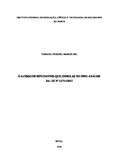O acesso de estudantes quilombolas no IFRN: análise da lei 12.711/2012

Visualizar/
Data
2018-03-27Autor
Marcelino, Fabiana
http://buscatextual.cnpq.br/buscatextual/visualizacv.do?id=K4701692D6
Metadado
Mostrar registro completoResumo
This dissertation aims to analyze the access of students to Integrated High School in the Campi of the Federal Institute of Education, Science and Technology of Rio Grande do Norte (IFRN) since the implementation of Law nº. 12.711/2012, which provides for admission in the federal universities and in the federal institutions of technical education of middle level and makes other provisions, establishing reserve of vacancies for students who have had their academic trajectory in public schools, and for black, pardos and indigenous students. This research is aimed at students located in regions where there are students living in quilombola communities. Specific objectives are: a) to analyze the Brazilian political scenario when the Federal Law nº. 12.711/2012; b) verify the forms of entry adopted by the IFRN for the Integrated High School after the implementation of the Law; and c) to show indicators of access of quilombola students as part of the policy of affirmative action of Professional Education in the IFRN. The Campi of the IFRN that have students residing in quilombola communities will be research spaces, even if the community is not in the Campus district. Thus, we highlight the relevance of this work for the black and quilombola population, and for Professional Education. For its effectiveness, we will adopt as a research methodology the analysis of aspects of the policy (FREY, 2000, VIANA, 1996, FIGUEIREDO M., FIGUEIREDO A., 1986, RAMOS, SCHABRACH, 2012, SILVA, 2016, CUNHA 2006, ROCHA, 2010, MULLER, SUREL, 2002) and in the qualitative approach, using a semi-structured interview, documentary analysis, bibliographic review, observation and field notes. We will discuss public policies in education, inequalities in education, affirmative action for young people in a situation of social vulnerability in the school system, issues involving the racial perspective in Brazilian education, and the implementation of Law nº. 12.711/2012 in the IFRN, leading to into account the historical and political context of its expansion. The analysis of the data extracted in the research indicates that, despite the institutional effort to achieve internalisation and social inclusion in schools, more vulnerable populations such as quilombolas still face strong access difficulties, particularly to Integrated High School.



